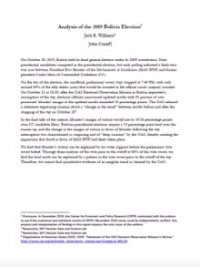
According to the Organization of American States (OAS), the Bolivian general elections of October 20, 2019 were marred by massive fraud in favor of Evo Morales’s party, the MAS [1].
According to the Constitution, the candidate who receives more than 50% of the vote in the first round, or between 40% and 50% with at least 10 percentage points ahead of the closest rival, is elected president. If neither condition is met, a run-off election is held.
In the evening of 20 October 2019, initial results indicated that a second round would likely be convened. However, the counting was interrupted after 83% of the ballot boxes were scrutinized. Former President Carlos Mesa and the OAS suspected outgoing President Evo Morales of having organized a massive electoral fraud. When the counting finally resumed 22 hours later, Evo Morales emerged as the victor. Carlos Mesa and the OAS denounced a manipulation. Deadly riots erupted, spreading across the entire country. Ultimately, Evo Morales was declared the winner, but resigned amid the chaos. The main elected officials also step down, while the second vice-president of the Senate, Jeanine Áñez, proclaims herself acting president. Evo Morales fled to Mexico, denouncing a coup.
Two Massachusetts Institute of Technology (MIT) statistical researchers, John Curiel and Jack R. Williams, studied the differences between the results before and after the halt in the vote count. According to them, there is "absolutely no reason to suspect fraud" and to lend credence to the accusations of Carlos Mesa and the Organization of American States [2].
Cuba and Venezuela are not represented on the OAS.
titre documents joints

Analysis of the 2019 Bolivia Election, Jack R. Williams and John Curiel.
https://www.voltairenet.org/IMG/pdf/Bolivia_report-short.pdf
(JPEG - 9.8 KiB)
[1] Elections in the Plurinational State of Bolivia October 20, 2019. Preliminary Finding Report to the General Secretary, Secretariat for Strengthening of Democracy (SSD), OEA.
[2] “Bolivia dismissed its October elections as fraudulent. Our research found no reason to suspect fraud”, John Curiel and Jack R. Williams, The Washington Post, February 27, 2020.

















Stay In Touch
Follow us on social networks
Subscribe to weekly newsletter